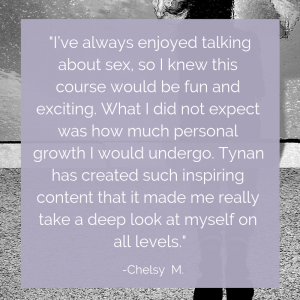[vc_row][vc_column][vc_column_text css=”.vc_custom_1693400263770{margin-bottom: 0px !important;}”]Sexual health across the lifespan is much more complicated than what we learned in high-school sex ed, assuming our parents didn’t opt us out. The sex ed I received was exclusively focused on preventing pregnancy and disease. While these topics are vital, this narrow focus left me and many others ill-equipped to understand and navigate consent and fairness in intimate relationships, ensuring my own pleasure, trying to conceive, medicalized childbirth, and the changes of perimenopause. The education system left my generation to fend for itself regarding these everyday human needs.
This is a huge part of why I’m so passionate about the work that doulas, perinatal educators, and birthworkers do to promote population and individual sexual health. I love being able to sit with clients for an hour or two and talk about all of the things we don’t usually talk about. This includes talks about the strain that timed intercourse can put on couples trying to conceive. Or the impact that a complicated pregnancy has on a couple’s sex life. It can look like strategizing on options to space out pregnancies post-c-section. It’s as holistic and infinite as people’s lives are.
This year’s theme for World Sexual Health Day is consent. While the obvious implication is about consent to sexual activity, there’s an important connection to make with informed consent in medical decision-making. Women, female-assigned, and gender non-conforming people are at risk of sexual violence for the same reason that we are at risk of obstetric violence. In the context of a patriarchal, misogynistic society, our bodies are devalued and objectified. Society sends us the message that our bodies are not truly our own constantly. We are usually depicted as objects of sexual desire as baby-making vessels. This dehumanization of our bodies plays out on the street, in relationships, and in health care.
By supporting birthers to think critically about bodily autonomy in medical decision-making, and to honour their bodies by requiring informed consent, we support birthers to think critically about why they are at risk of losing bodily autonomy in all aspects of their lives, and we teach them to expect and demand more.
There is no sexual health without reproductive justice. The reproductive justice framework advanced by African-American women envisions a world where everyone can make reproductive choices, including the right to have and not have children, as facilitated by unfettered access to reproductive health care and social services. Informed consent is the foundation on which choice rests.
It’s also Labour Day, making this a great opportunity to express gratitude for all the hard and life-changing work that you are doing to promote health, choice, well-being, and change in your communities. We will continue to advocate for improved access to doula support and income security for birth and reproductive justice professionals. A labour of love is still labour. Clients deserve access based on need and we deserve to be able to make a living doing this community-building work.
Keira Grant (she/her) brings a wealth of experience to her EDI Co-Lead role. She is a Queer, Black woman with a twenty-year track record in Equity, Diversity, and Inclusion (EDI) education, projects, and community building initiatives. As a mom and partner she uses her lived expereince to provide support and reflection for her clients and her work. Keira is the owner of Awakened Changes Perinatal Doula Services.[/vc_column_text][/vc_column][/vc_row]


 hat’s as important as knowledge, is also self-reflection. Has someone ever told you about a food they love to eat that made you want to gag? More than one of my family members hates chocolate, like, really hates it. Luckily, because most people I know love chocolate at least half as much as I do, I don’t feel ashamed for my love of chocolate when so-and-so closes their eyes and makes a gag sound. Sex is similar and in a very important way also different. Because sex is so taboo, and most of us have felt some kind of judgement or shame for some aspect of our sexuality over the course of our lifetime, it’s all the more important to check-ourselves.
hat’s as important as knowledge, is also self-reflection. Has someone ever told you about a food they love to eat that made you want to gag? More than one of my family members hates chocolate, like, really hates it. Luckily, because most people I know love chocolate at least half as much as I do, I don’t feel ashamed for my love of chocolate when so-and-so closes their eyes and makes a gag sound. Sex is similar and in a very important way also different. Because sex is so taboo, and most of us have felt some kind of judgement or shame for some aspect of our sexuality over the course of our lifetime, it’s all the more important to check-ourselves. Tynan Rhea is a settler with German and Czechoslovakian ancestry. Tynan has a private practice online and in Toronto as a counselor, aromatherapist, and doula specializing in sex, intimacy, and relationships throughout the reproductive years and founder of PostpartumSex.com. Tynan graduated from the University of Waterloo with a Joint Honours Bachelor of Arts in Psychology and Sexuality, Marriage, & Family. They received their doula training from the Revolutionary Doula Training program and their aromatherapy training with Anarres Apothecary Apprenticeship program. Tynan is currently enrolled at Yorkville University doing their Masters of Arts Counselling Psychology degree. Tynan approaches their practice from sex-positive, trauma-informed, anti-oppressive, and feminist frameworks. Find Tynan on
Tynan Rhea is a settler with German and Czechoslovakian ancestry. Tynan has a private practice online and in Toronto as a counselor, aromatherapist, and doula specializing in sex, intimacy, and relationships throughout the reproductive years and founder of PostpartumSex.com. Tynan graduated from the University of Waterloo with a Joint Honours Bachelor of Arts in Psychology and Sexuality, Marriage, & Family. They received their doula training from the Revolutionary Doula Training program and their aromatherapy training with Anarres Apothecary Apprenticeship program. Tynan is currently enrolled at Yorkville University doing their Masters of Arts Counselling Psychology degree. Tynan approaches their practice from sex-positive, trauma-informed, anti-oppressive, and feminist frameworks. Find Tynan on